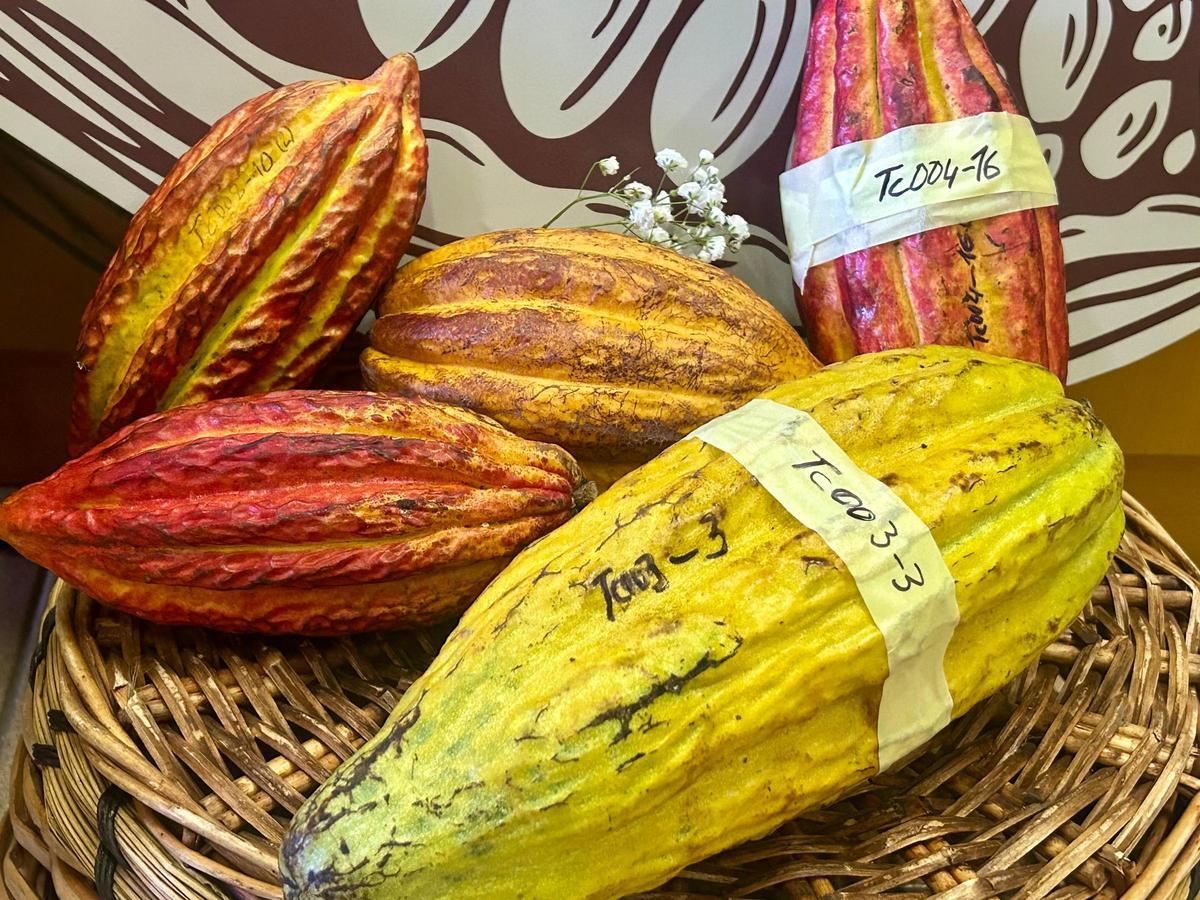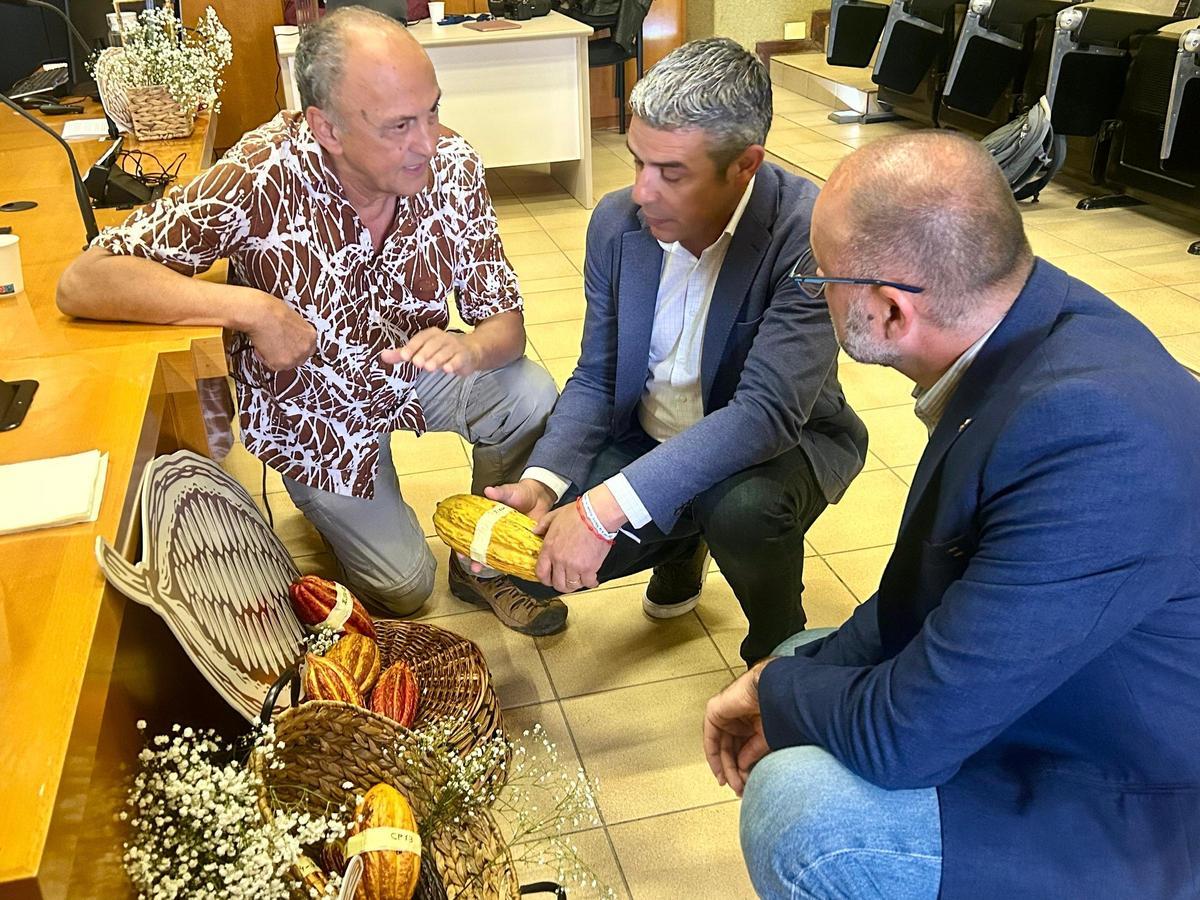The Encounter between producers and cocoa processors took place this Friday in Tenerife, bringing together a team of researchers, farmers and agricultural workers in the sector across the Canary Islands, along with representatives from fifteen firms within the Association for the Promotion of Chocolate Bean to Bar de Téste Artesano. They expressed their enthusiasm for the potential of the Canary Islands concerning this crop, aiming to cultivate the first commercial cocoa in Spain.
This technical gathering was arranged as part of a research initiative that examines the current status of coffee and cocoa cultivation in the Canary Islands. It also looks at the efforts made to organise local producers into associations, developed by the Canarian Institute for Agricultural Research (ICIA) with support from the Canary Islands government. This forum aimed to foster discussion and disseminate scientific knowledge among industry professionals, allowing for exploration of the opportunities this crop presents in the archipelago and its potential as a raw material for crafting artisanal chocolates.
The Minister of Agriculture, Livestock, Fisheries, and Food Sovereignty, Narvay Quintero, inaugurated the event held at the Isamar farm in Valle Guerra (Tenerife), which also saw participation from the president of the IICA, Janira Gutiérrez; the scientific director of the agency, María del Carmen Jaizme Vega; and the lead researcher on the project, Alfredo Reyes Betancort.

Canarian cocoa / ED / LP
Regarding the cocoa potential in the Canary Islands, the area lead emphasised that “the climatic conditions of the Canary Islands facilitate the growth of this crop, which can serve as an alternative source of income for our producers, both through its sale as a gourmet product and via initiatives tied to the expanding agrotourism sector.”
Jaizme further noted that “this project commenced with a study on the status of cocoa and coffee crops in the Canary Islands, but it will also enable us to diversify agriculture in the region and enhance biodiversity through a blend of tropical crops.”
In addition, Reyes explained that “the initial results indicate that pollination occurs naturally in the Canary Islands, and we are currently researching pollinating insects to gain a better understanding of this process and potentially promote it.”
This initiative started in November 2023 with 25 cocoa plants and currently monitors 578 specimens distributed across 18 plantations (including 4 in La Palma, 2 in La Gomera, and 2 in El Hierro), aimed at enhancing the most exquisite and exceptional varieties.
Following the opening remarks, the meeting proceeded with the presentation ‘analysis of the current situation and evolution of cocoa culture in the Canary Islands. Initial results on flowering, fruiting, ripening of fruits, and project development across 5 islands, alongside the challenges to be addressed’, delivered by Alfonso Moista, a collaborator on this ICIA project. He shared preliminary findings from the study and highlighted that cocoa could be a lucrative crop as a supplementary source for small producers, especially if partnerships with processing companies focused on the production of high-quality products are established.

Narvay Quintero, during the meeting. / ED / LP
In this context, he drew attention to Taiwan as a model for an island territory chocolate producer that has established a thriving industry founded on high-quality products. Notably, successful cases of integrating agrotourism in the cocoa sector through experience and product sales to visitors, such as on the Caribbean island of Grenada, were also highlighted.
Following this, the president of the Bean To Bar Association, Jaume Martorell, outlined the workings of the international cocoa market and the prospects it may present for small producers in the Canary Islands during his presentation titled ‘Specifications of the Artisan Sector of Chocolate Preparation (Bean To Bar): Quantity, prices and qualities of cocoa for artisanal and industrial use’.
Besides large food industries, Martorell discussed the opportunities for the Canary Islands within the segment of fine and extrafine chocolate, where organic production, product traceability, and unique sensory properties are valued by consumers seeking distinctive flavours connected to specific regions or production methods. He emphasised the necessity of promoting the Canary brand to enhance the product’s provenance, similar to what is already being accomplished, for instance, with bananas.
After the two presentations, a discussion session ensued, allowing all participants to engage in dialogue through a round-table format aimed at fostering communication between cocoa producers and representatives from processing companies, facilitated by the research personnel. Following this, attendees visited the experimental plot at the Los Pajalillos estate, where the ICIA maintains a collection of various cocoa varieties within their greenhouses for research purposes concerning this crop’s characteristics.
Ultimately, the meeting will conclude this Saturday with a chocolate tasting organised by the Bean To Bar collective in association with the City Council of Los Realejos, allowing professionals to sample some of the finest chocolates in the country and learn about the craft of artisan chocolatiers.
















